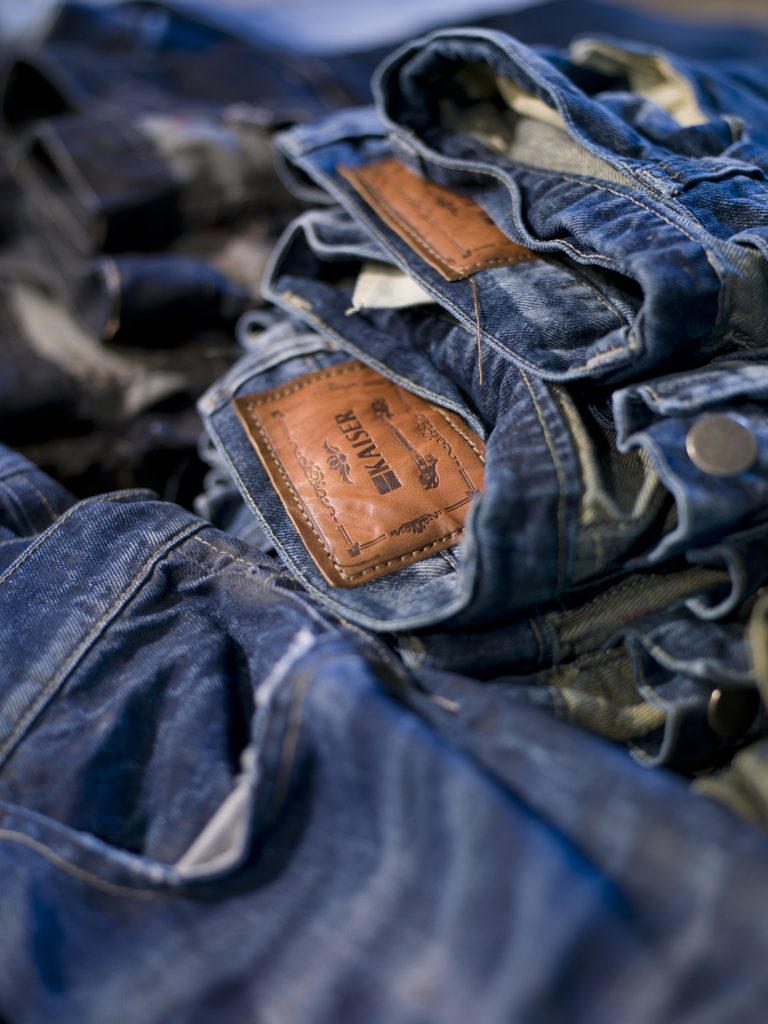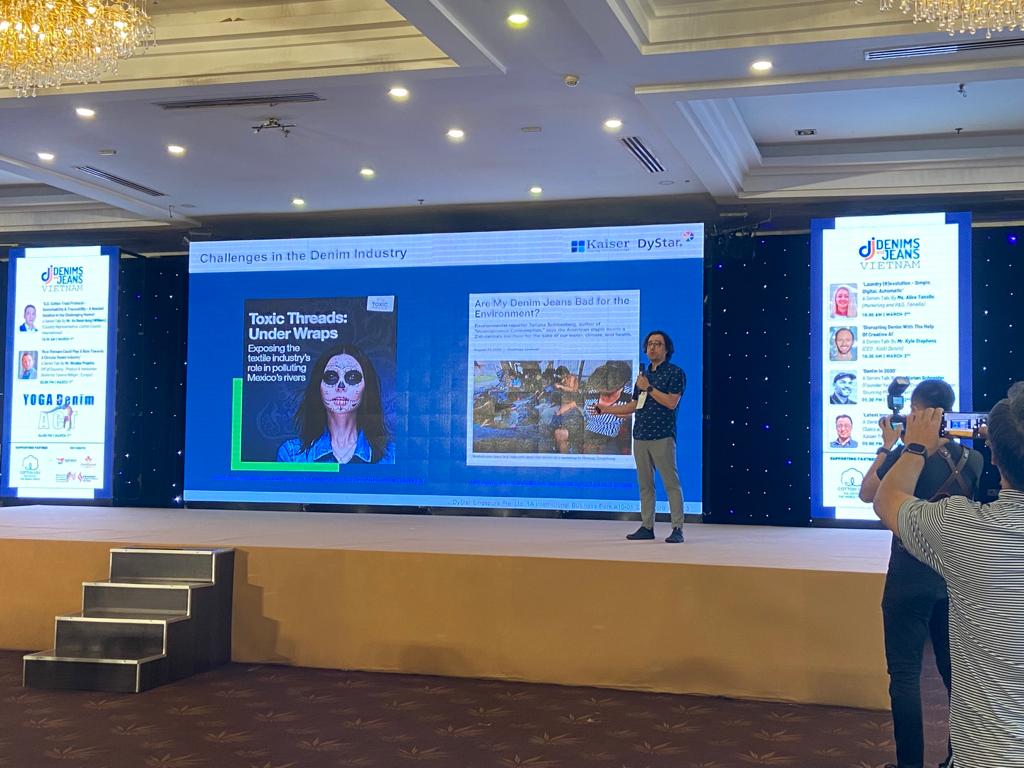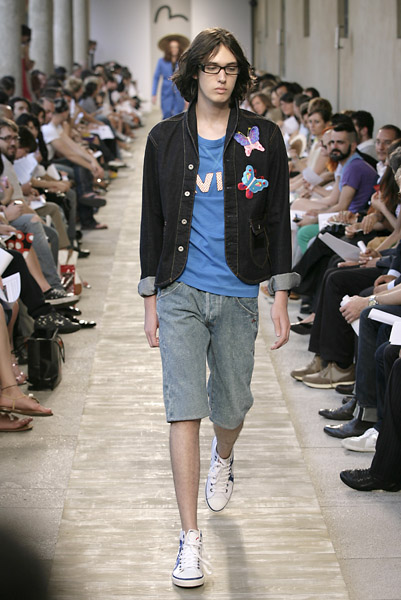Kaiser is a leading laundry auxiliaries and colorants provider, offering sustainable solutions for customers across the world. With a Dystar heritage of more than a century in product development and innovation for the textile industry, Kaiser offers the best available products and technologies for laundries.
Kaiser is also a long term partner for Denimsandjeans Shows . We welcomed them back at our Denimsandjeans Show in Vietnam ( June 26-27) and talked with We talked with Serdar Demircioglu – Sales and Marketing Director from Kaiser on what latest developments they will bring on the table !
How have you seen the apparel world change in the past covid scenario and how do you see the changes affecting garment washing in the near future.
In the post-COVID scenario, the apparel world has experienced significant shifts, particularly in consumer behavior, supply chain dynamics, and manufacturing practices. There are some changings likely to impact garment washing in some ways:
Shift to Casual and Comfortable Clothing: With more people working from home and socializing in relaxed settings, there has been a notable increase in demand for casual and comfortable clothing, including denim. This trend towards casualization could influence the types of denim garments being produced and subsequently washed in industrial facilities, with a focus on softer finishes and comfortable fits.
Sustainability Considerations:Environmental sustainability has become a key priority for many consumers and brands in the post-COVID era. Garment washing processes typically involve significant water, chemical, and energy usage, which can have negative environmental impacts. As a result, there may be growing pressure on manufacturers to adopt more sustainable washing practices, such as water-saving techniques, eco-friendly chemicals, and alternative application methods.
Supply Chain Disruptions: The pandemic exposed vulnerabilities in global supply chains, prompting many apparel brands to reassess their sourcing and manufacturing strategies. This could lead to changes in where denim garments are produced and washed, with a potential shift towards more regionalized or localized manufacturing to mitigate supply chain risks and reduce transportation emissions.

We thank you for again joining the Denimsandjeans Vietnam show in 2024. What would be your focus during this show and what kind of customers do you want to reach out to ?
At DenimsandJeans Vietnam 2024, our focus would be on showcasing the latest trends, innovations, and sustainable practices in the garment washing industry. We would showcase cutting-edge technologies and innovations that are driving positive change in the laundry industry. This could include advancements in laser and ozone finishing techniques, new coating looks, special dyeing processes with less water usage and different application methods for laundry processes.
We would aim to engage with garment manufacturers, fabric mills, and suppliers looking to adopt sustainable practices and integrate innovative chemical technologies into their operations. This could involve showcasing solutions for improving resource efficiency, reducing environmental impact, and enhancing product quality throughout the garment and fabric supply chain.
Overall, our goal at DenimsandJean Vietnam 2024 would be to inspire and educate garment industry stakeholders about the importance of sustainability, innovation, and responsible practices in shaping the future of denim. By targeting a diverse range of customers and addressing key themes and trends, we aim to facilitate meaningful discussions and collaborations that contribute to a more sustainable and ethical denim&garment industry.

What would you rank you most innovative and sustainable solutions which are also widely accepted.
Our water-free and stone free enzyme concept widely accepted in the laundry sector since last 2 years. By this way we are able to eliminate pumice stone usage in laundry application by using less water. Our Laser and ozone products are also running in the market and additionally we are working on new application methods for laundry market.


How do you see Vietnam evolving over the next few years in terms of fabric and garment productions. Do you think it could perhaps evolve in a more sustainable manner than the other major centers of garment production.
Vietnam has emerged as a significant player in the global fabric and garment production industry over the past few years, and its evolution in the coming years is likely to be influenced by several factors, including sustainability considerations, technological advancements, and shifting market dynamics. There is growing recognition of the importance of sustainability in the textile and garment industry, driven by environmental concerns and changing consumer preferences. Vietnam has the opportunity to position itself as a leader in sustainable fabric and garment production by adopting eco-friendly materials, implementing resource-efficient manufacturing processes, and promoting transparency and accountability throughout the supply chain. Vietnam has the potential to evolve in a more sustainable manner than other major centers of garment production by leveraging its strengths in technology, innovation, and collaboration. By embracing sustainability as a core principle and adopting responsible practices throughout the value chain, Vietnam can contribute to the global transition towards a more sustainable and equitable textile and garment industry.
What do you see as the furutre of denim?
The future of denim is likely to be shaped by several trends and factors, including sustainability, technology, and shifting consumer preferences. As environmental concerns become increasingly important to consumers, the denim industry is likely to see a continued focus on sustainability. This could involve the use of eco-friendly materials such as organic cotton, recycled denim, and alternative fibers like hemp and Tencel. Additionally, denim manufacturers may adopt more sustainable production processes, such as water-saving techniques, reduced chemical usage, and improved waste management. With advancements in technology such as 3D printing and digital design tools, consumers may have greater opportunities to customize and personalize their denim garments. This could involve choosing specific fits, finishes, and embellishments, allowing individuals to create unique pieces that reflect their personal style and preferences. Denim has always been influenced by cultural and fashion trends, and this is likely to continue in the future. Emerging trends in streetwear, vintage revival, and sustainability-conscious fashion may influence the styles, washes, and silhouettes of denim garments.
Overall, the future of denim is expected to be characterized by innovation, sustainability, and adaptability to changing consumer needs and preferences. Whether it’s through eco-friendly chemicals, technological advancements, or personalized experiences, denim is likely to remain a versatile and enduring staple in the fashion landscape.
To contact the team , please mail here – serdard@kaisertekstil.com




